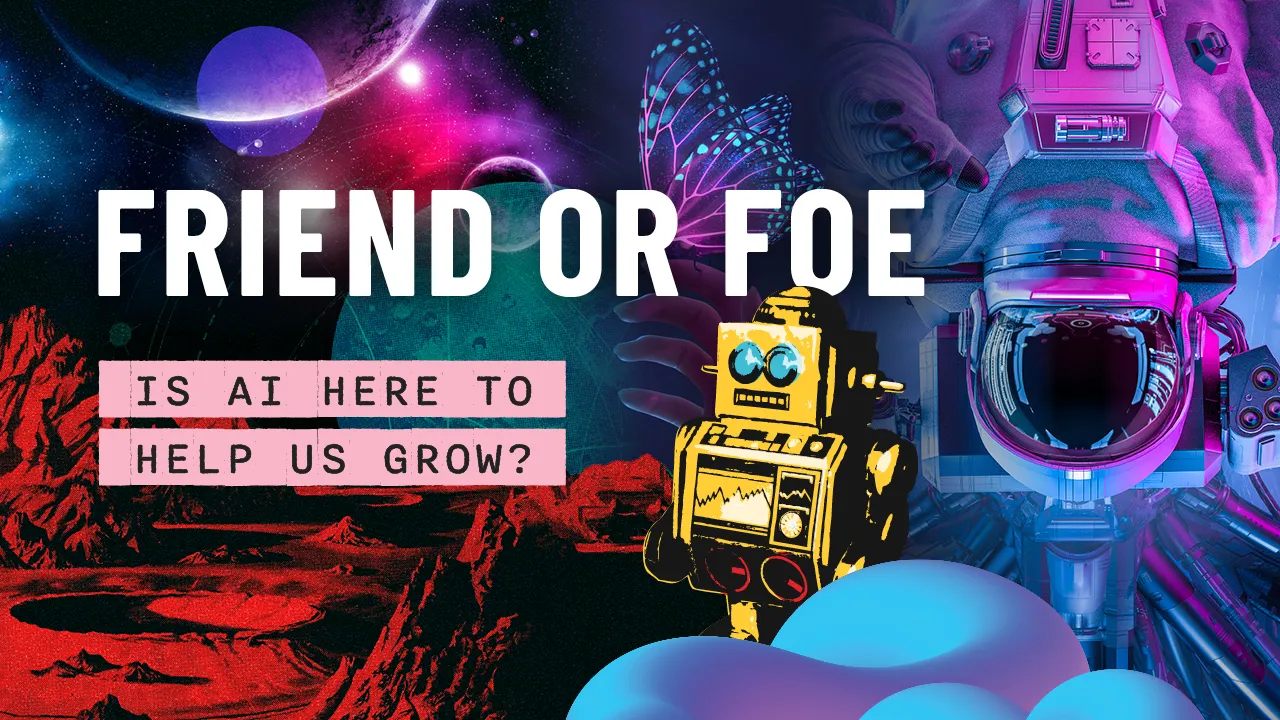Discover how AI is reshaping industries, empowering professionals, and driving innovation. Read more as we navigate the evolving AI landscape and equip you with the knowledge to thrive in the age of AI.
AI, or Artificial Intelligence, refers to computer systems that possess human-like cognitive abilities, such as problem-solving and decision-making. Its influence is rapidly expanding across industries, revolutionizing processes and enabling innovation. However, many are concerned that AI is coming for their jobs.
On the positive side, AI has the potential to augment human capabilities. This will increase productivity and provide valuable insights for informed decision-making. By embracing AI as a tool for collaboration, humans and AI can work together to create a more efficient and innovative future.
In this blog, we will debunk the common AI myths, fears, and concerns and offer practical tips for individuals and business professionals to adapt and thrive in the evolving tech industry.
The power of AI and its growing influence on various industries
AI technology has emerged as a powerful force, driving transformative changes across various industries. It has the ability to analyze vast amounts of data, identify patterns, and make intelligent predictions, leading to improved efficiency, accuracy, and decision-making.
Some of the top industries harnessing AI include:
- Healthcare, where AI aids in diagnostics, drug discovery, and personalized medicine.
- Financial services benefit from AI-powered fraud detection and algorithmic trading.
- Manufacturing utilizes AI for process optimization and predictive maintenance.
- Retail and e-commerce employ AI for personalized recommendations and demand forecasting.
- Autonomous vehicles and transportation systems rely on AI for navigation and safety.
Additionally, AI finds applications in cybersecurity, agriculture, customer service, and many other sectors. The growing influence of AI in these industries showcases its potential to revolutionize workflows, enhance productivity, and drive innovation.
Understanding AI: Debunking common AI misconceptions
AI presents ample career growth and digital innovation opportunities. AI specialists are highly sought after, and roles like AI engineers and data scientists are in high demand. Automation of repetitive tasks frees up time for workers to focus on higher-value activities, fostering creativity and critical thinking. This integration of AI drives innovation, enabling individuals to develop new skills and advance their careers.

Clearly, AI presents many opportunities for career growth and digital innovation in the workforce across many industries. Yet, there are still many misconceptions about AI and how it will influence the future workforce. We’ve taken it upon ourselves to debunk these myths and provide insights on how individuals and business leaders can overcome them.
Myth 1: AI will Replace Human Jobs Entirely
Debunking the myth: While AI has the potential to automate certain tasks, it is unlikely to completely replace human jobs. AI is designed to augment human capabilities, not replace them. In many cases, AI technology is used to streamline repetitive and mundane tasks, allowing humans to focus on more complex and creative aspects of their work. Instead of job replacement, AI often leads to job transformation, where humans collaborate with AI systems to achieve better outcomes.
“Like any technology, there can always be a fear of being replaced, but like any other technology that comes into play, it helps automate things but it’s not going to full replace. There is still so much space for the humans working on these tools to remain there and own the digital transformation,” said Lupe Colangelo, Manager for Outcomes Partnerships at GA.
For business leaders: Business leaders can overcome this myth by educating job seekers about the collaborative nature of AI and the new opportunities it brings to the workforce.
For individuals: Individuals in tech can focus on showcasing the collaborative nature of AI and its potential to enhance human productivity and creativity. They can highlight examples where AI technology has improved job functions and created new opportunities.
Myth 2: AI is Only for Big Corporations and Tech Giants
Debunking the myth: While big corporations and tech giants have been at the forefront of AI development, AI technologies are becoming increasingly accessible to organizations of all sizes. Many cloud-based AI platforms and services are available at affordable prices, enabling smaller companies to leverage AI capabilities for their business needs. Additionally, open-source AI frameworks and libraries provide opportunities for individuals and smaller organizations to contribute to AI development.
For business leaders: Business leaders can highlight the diverse range of organizations that are adopting AI and emphasizing the potential for growth and innovation in smaller companies.
For individuals: Individuals in tech can actively participate in initiatives that democratize AI, such as open-source projects, hackathons, and online communities. They can develop AI tools and applications that cater to the needs of small and medium-sized enterprises (SMEs) or collaborate with startups and non-profit organizations to make AI more accessible.
Myth 3: Understanding the Complexities of How AI Works is For Tech Natives Only
Debunking the myth: AI technology is becoming more user-friendly, and there are numerous tools and platforms that simplify AI implementation and usage. Many AI applications offer intuitive interfaces and require minimal coding knowledge. Non-technical professionals can utilize AI to gain insights from large datasets, automate repetitive tasks, and enhance decision-making processes. Some organizations are even providing training programs and resources to upskill employees in AI concepts and applications.
For business leaders: Business leaders can overcome this by emphasizing the availability of user-friendly AI tools and the potential for non-technical professionals to contribute to AI-driven projects. Additionally, business leaders should provide employees with training to realize the power of AI and upskill in valuable tech skills.
For individuals: tech professionals can debunk this myth by sharing success stories of non-tech professionals using AI effectively. They can organize workshops and events to showcase AI’s user-friendly tools and inspire confidence in its adoption.
Myth 4: Only Tech Experts can Work With AI
Debunking the myth: While technical expertise is valuable in developing AI systems, the field of AI encompasses various disciplines, including data analysis, domain expertise, and ethical considerations. Collaboration between experts from different backgrounds is crucial for successful AI implementation. Moreover, as AI technology advances, the focus is shifting toward developing AI tools that are accessible to a wider range of users. User-friendly AI platforms, low-code or no-code AI development environments, and automated machine learning (AutoML) are simplifying the process of building AI models.
For business leaders: Business leaders can find and hire individuals with a multidisciplinary skill set and highlight the growing accessibility of AI tools and resources.
For individuals: Tech professionals can work towards developing low-code or no-code AI development environments that enable individuals with diverse backgrounds to participate in AI projects. They can advocate for interdisciplinary collaboration, where subject matter experts team up with technical experts to develop AI solutions.
Myth 5: AI Lacks Ethics and Will Harm Humanity
Debunking the myth: Ethical considerations are integral to the development and deployment of AI systems. Organizations and researchers are actively working on developing frameworks and guidelines to ensure responsible and ethical AI practices. These efforts include addressing biases in data and algorithms, promoting transparency and explainability of AI systems, and involving diverse perspectives in AI development. Initiatives such as AI ethics committees and regulatory guidelines aim to prevent AI from causing harm and ensure that it benefits humanity.
For business leaders: Business leaders can overcome this myth by prioritizing candidates with a strong understanding of ethical considerations in AI and promoting ethical AI practices within their organizations.
For individuals: Individuals working in tech can actively engage in ethical discussions and contribute to the development of ethical frameworks for AI. They can prioritize fairness, transparency, and accountability in AI systems and algorithms. By incorporating diverse perspectives in AI design and development, conducting thorough ethical evaluations, and adhering to regulatory guidelines, tech professionals can ensure that AI technologies are aligned with societal values and do not harm humanity.
Steps individuals and leaders can take to leverage its transformative power

Here are the five ways that individuals and leaders can harness to start utilizing the transformative power of AI technology today.
5 Steps For Individuals
- Embrace AI in everyday life: individuals can actively integrate AI into their daily routines by leveraging AI-powered applications and devices. For example, using virtual assistants like Siri or Alexa to assist with tasks, managing schedules, and answering questions. Smart home devices can automate household chores, freeing up time for leisure activities or personal pursuits. By embracing AI in everyday life, individuals can experience firsthand the convenience and efficiency it brings.
- Learn to speak AI: encouraging individuals to learn about AI concepts, technologies, and applications is crucial. They can utilize AI-powered educational platforms that offer personalized e-learning apps, language learning assistants, or adaptive learning systems. These tools provide tailored recommendations and feedback, enabling individuals to accelerate their learning progress and stay informed about the latest advancements in AI.
- Make AI work for you: it’s important to help individuals recognize how AI can enhance their current roles or open up new career paths. They can start experimenting with tasks and projects where AI can automate repetitive or time-consuming processes, allowing them to focus on higher-value work and prioritize their goals better. Exploring AI-powered tools and platforms tailored to their interests or industry can also provide new opportunities and efficiencies.
- Celebrate continuous learning: emphasizing the need for lifelong learning is essential to stay relevant in an AI-driven world. Individuals should be encouraged to continuously upskill and reskill themselves to adapt to evolving technological landscapes. At General Assembly, we provide supportive communities and access to industry experts, offering networking opportunities and training programs that equip individuals with the digital skills necessary to thrive in an AI-powered future.
- Stay ethically aware: recognizing the ethical implications of AI is crucial for individuals working with or impacted by AI technology. It’s important to stay informed about biases, privacy concerns, and potential risks associated with AI. By understanding these issues, individuals can make informed choices and advocate for responsible AI development and usage. Promoting discussions and awareness of ethical considerations will contribute to the development of AI systems that align with societal values and prioritize the well-being of individuals and communities.
5 Steps For Business Leaders
- Assess business needs and goals: Business leaders should introduce the value of AI to their organizations and assess how AI can align with their business objectives. They can identify specific areas where AI can bring value, such as improving customer service, optimizing supply chain management, enhancing product development, or streamlining internal processes. By conducting a thorough assessment of existing processes and identifying pain points, leaders can determine how AI can address those challenges effectively. It’s also critical to assess your company’s org chart to analyze if job functions can be improved with AI.
- Embrace change and invest in digital skills: to fully leverage the potential of AI, business leaders should promote the importance of acquiring digital skills within their organizations. They can foster a culture of continuous learning and upskilling by providing access to trusted training providers like General Assembly. By investing in digital skills development, leaders can ensure their workforce is equipped to understand, adopt, and effectively utilize AI technologies across various roles and departments.
- Establish a trusted talent pool of tech experts: building a trusted talent pool of tech experts is crucial for successful AI implementation. Business leaders can establish partnerships with industry experts, tech bootcamps, or academic institutions to access top talent. By creating a pipeline of skilled professionals with a digital-first mindset, leaders can ensure they have the expertise needed to develop and deploy AI solutions effectively within their organization.
- Recalculate DEI goals and hiring practices: diversity, equity, and inclusion (DEI) play a critical role in responsible AI development and implementation. Business leaders should reevaluate their DEI goals and hiring practices, particularly in tech-related departments and teams. Ensuring diversity within these teams brings diverse perspectives and experiences, which can help address biases and ethical challenges associated with AI systems. By actively working towards diverse representation, leaders can foster responsible AI and moral integrity within their organization.
- Stay in the loop as AI evolves: business leaders must actively educate themselves about the evolving landscape of AI technology to envision how it will continue to disrupt the workforce and industry. They should conduct competitor research to gain insights into how other organizations are leveraging AI among their tech teams and stay updated on emerging trends and developments in AI. Connecting with industry experts, attending conferences, and participating in relevant communities will enable leaders to assess their talent pipeline and understand the potential impact AI can have on their businesses.
Unlocking the power of AI: embrace, learn, and lead with General Assembly
AI technology presents transformative opportunities for individuals and businesses alike. By debunking common AI myths and understanding its potential, individuals can embrace AI in their daily lives, learn new skills, make it work for them, continuously upskill, and remain ethically aware. Likewise, business leaders can assess their needs, invest in digital skills, build a talented tech workforce, prioritize diversity and inclusion, and stay informed about AI advancements. To set your team up for success in the age of AI, contact General Assembly, a trusted training provider that offers programs and resources to equip your organization with the necessary skills and knowledge.
Embrace the power of AI, drive innovation, and ensure a prosperous future with General Assembly, contact us to learn how we can set your team up for success. If you’re interested in a tech career to fully transition into the world of AI join one of our free workshops or events.
